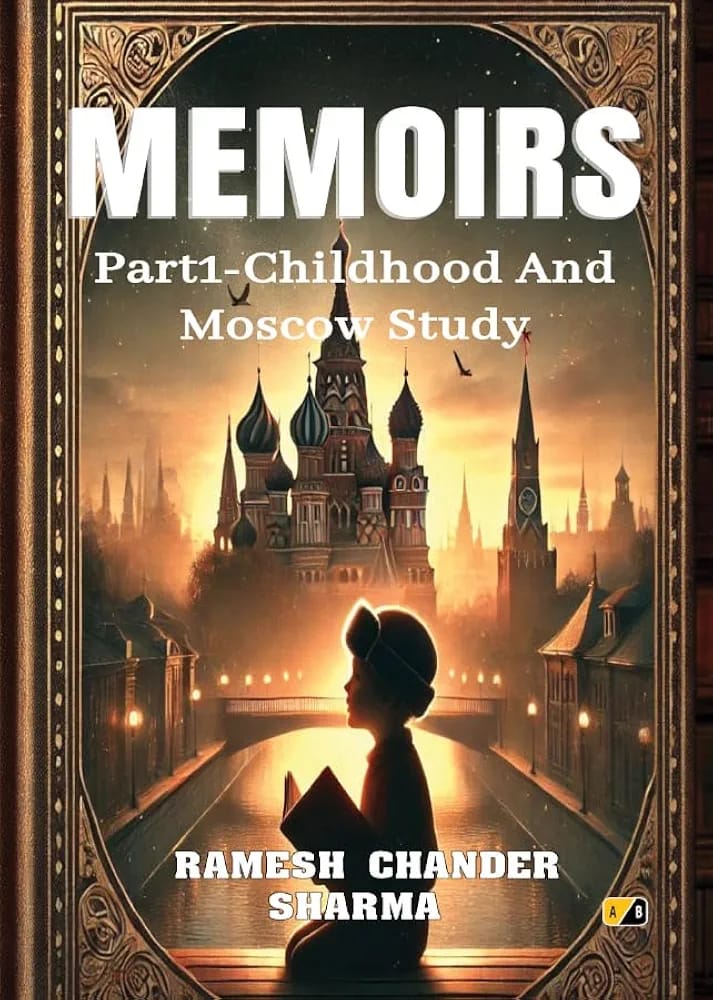Renowned Author Ramesh Chander Sharma Unveils His Memoir: A Journey from Raekot to Moscow
6 min read
In an era where personal narratives offer unique insights into historical shifts and individual perseverance, Ramesh Chander Sharma’s new memoir, MEMOIRS: Part 1 – Childhood And Moscow Study, emerges as a compelling contribution. Born in 1952 in the small township of Raekot in Punjab, a community that witnessed the seismic shifts following the Partition of India in 1947, Sharma’s narrative interweaves personal history with broader cultural and political transformations. Our team at India Prime Times had the opportunity to meet Sharma recently, and his reflective conversation on his experiences left a lasting impression, providing readers with an authentic look into a life marked by resilience and intellectual curiosity.
A Childhood Amidst Turbulence and Community Resilience
Ramesh Chander Sharma’s early life in Raekot was defined by the dual challenges of displacement and the forging of new beginnings. Born into a family that migrated from Pakistan during the tumultuous times following Partition, his childhood was steeped in the shared struggles and aspirations of Hindu and Sikh communities. “In Raekot, community was everything,” Sharma recalled during our conversation. “We supported each other not only to survive but to rebuild our lives, setting the stage for the small businesses that eventually began to flourish in our town.”
His formative years, nurtured within the humble environs of government schools, instilled in him a sense of determination. Excelling academically from a young age, Sharma’s distinction in school paved the way for higher education opportunities, a turning point in his life that he documents with meticulous detail in his memoir.
From Raekot to the Academic Hubs of Delhi
Ramesh Chander Sharma’s academic journey took a decisive turn when he secured admission to HansRaj College at Delhi University. Here, the transition from the familiar landscapes of Punjab to the bustling corridors of Delhi marked a significant shift. “Delhi presented a new world of ideas and possibilities,” he shared. This transition, as recounted in his memoir, was not just geographical but also intellectual. The bustling academic environment of Delhi University was instrumental in shaping his future pursuits.
While pursuing his higher education in Physics, Ramesh Chander Sharma’s intellectual curiosity led him beyond the boundaries of conventional learning. His academic excellence caught the attention of scholarship committees, which eventually granted him an opportunity to study at the Peoples’ Friendship University in Moscow. This period in Moscow is one of the central themes of his memoir, offering readers a rare glimpse into life under the ideologies of socialism and communism in the Soviet Union during the early 1970s.
Moscow: A Crucible of Transformation
The transition from Delhi’s vibrant academic life to the austere yet intellectually charged environment of Moscow provided Ramesh Chander Sharma with experiences that would forever change his perspective on life. “Moscow was not just a city; it was a living classroom,” Ramesh Chander Sharma explained, highlighting the transformative nature of his stay. His time in Moscow opened up new vistas, both ideologically and culturally, and his memoir delves into the nuances of adapting to a completely different societal structure.
During our in-depth discussion, Ramesh Chander Sharma spoke passionately about how the Soviet atmosphere, with its rigorous discipline and the pervasive influence of socialism, imparted lessons that went far beyond academic instruction. His narrative reflects on how these experiences contributed to a broader understanding of governance, economics, and the role of the state in everyday life, a perspective that is rare among those who have navigated such contrasting cultural terrains.

A Career Spanning Decades in the Banking Sector
Upon returning to India in 1976, Ramesh Chander Sharma transitioned into a career that, while seemingly divergent from his academic and international pursuits, was integral to his multifaceted personality. He joined UCO Bank in 1978 and served the institution until his retirement in 2012. His career in banking is marked by the same dedication and analytical rigor that defined his academic endeavors. Over the course of more than three decades, Sharma not only witnessed the evolution of the banking sector in India but also played a part in steering its growth during transformative economic times.
During our interaction, he reflected on the interplay between his professional life and his intellectual pursuits. “Working in the bank allowed me to see the practical applications of theories and ideas that I once learned in the lecture halls of Delhi and Moscow,” Ramesh Chander Sharma remarked. His insights into the banking industry are particularly valuable for readers interested in understanding the broader context of India’s economic development during the late 20th and early 21st centuries.
An Intimate Look Through Memoirs
MEMOIRS: Part 1 – Childhood And Moscow Study is not just a personal recollection but a layered narrative that captures the essence of historical change through individual experience. Ramesh Chander Sharma’s detailed account of his journey from a small township in Punjab to the corridors of international academia and the pragmatic world of banking provides a multifaceted perspective on life in modern India. His memoir is meticulously documented, offering readers a chance to connect with the human stories behind historical events.
What sets this memoir apart is Ramesh Chander Sharma’s candid reflection on both triumphs and tribulations. The book serves as a window into his personal growth and the myriad influences that shaped his worldview. Notably, Sharma’s narrative is enriched by his ability to juxtapose the simplicity of his early life in Raekot with the complexities of life in Moscow, a contrast that underscores the adaptability and resilience required to thrive in diverse environments.
Personal Tributes and Enduring Legacies
Beyond the professional and academic milestones, Ramesh Chander Sharma’s memoir also carries a deeply personal note. In a poignant dedication, he honors his late daughter, Ashima Sharma, who passed away on August 28, 2023, at the young age of 42. This heartfelt tribute is interwoven with his recollections and stands as a testament to the enduring influence of personal loss on one’s life narrative. During our meeting, Sharma spoke with a mix of pride and sorrow as he recounted memories of Ashima, underscoring how personal experiences continue to inform his reflections on life and legacy.
A Meeting of Minds at India Prime Times
Our encounter with Ramesh Chander Sharma was both enlightening and inspiring. The India Prime Times team was particularly impressed by his ability to bridge diverse worlds, academia, international study, and a long-standing career in banking, while remaining deeply connected to his roots. His willingness to share the intimate details of his journey and the lessons he has drawn from his experiences provides a rich resource for readers interested in understanding the confluence of history, culture, and personal determination.
In our conversation, Ramesh Chander Sharma emphasized the importance of documenting personal histories as a way to preserve the intricate fabric of societal evolution. “Every personal story contributes to the larger narrative of our nation,” he remarked, encouraging others to reflect on their own journeys and the broader historical contexts they are a part of.
Looking Ahead: The Significance of Memoirs in Contemporary India
Ramesh Chander Sharma’s memoir comes at a time when India is increasingly valuing narratives that offer insights into its complex past. His account not only chronicles a life lived through pivotal historical moments but also serves as an important reminder of the human capacity for resilience and adaptation. For students, historians, and general readers alike, MEMOIRS: Part 1 – Childhood And Moscow Study is poised to become a valuable addition to the repository of personal histories that illuminate the intricate interplay between individual lives and national evolution.
As our team at India Prime Times continues to explore stories that enrich our understanding of India’s multifaceted identity, Ramesh Chander Sharma’s work stands as a testament to the enduring power of personal narrative. His memoir is more than a recounting of events, it is a journey through time, marked by cultural intersections and the relentless pursuit of knowledge.
In closing, Ramesh Chander Sharma’s contribution to the literary and historical discourse offers an engaging and thoughtful perspective on the myriad experiences that have shaped modern India. His memoir is a must-read for anyone interested in the interplay of personal experiences with broader historical and cultural shifts, and our conversation with him reaffirms the timeless value of storytelling as a bridge between the past and the present.





